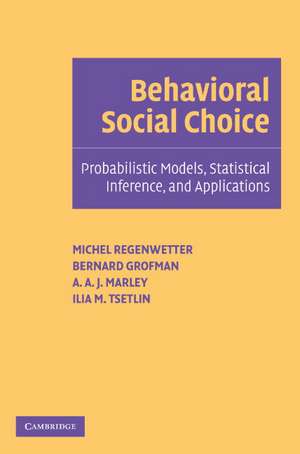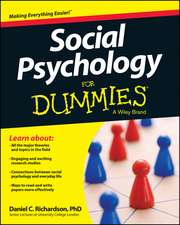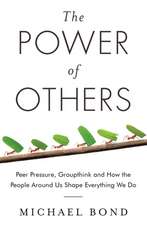Behavioral Social Choice: Probabilistic Models, Statistical Inference, and Applications
Autor Michel Regenwetter, Bernard Grofman, A. A. J. Marley, Ilia Tsetlinen Limba Engleză Paperback – 14 mai 2006
| Toate formatele și edițiile | Preț | Express |
|---|---|---|
| Paperback (1) | 327.16 lei 6-8 săpt. | |
| Cambridge University Press – 14 mai 2006 | 327.16 lei 6-8 săpt. | |
| Hardback (1) | 552.10 lei 6-8 săpt. | |
| Cambridge University Press – 14 mai 2006 | 552.10 lei 6-8 săpt. |
Preț: 327.16 lei
Nou
Puncte Express: 491
Preț estimativ în valută:
62.60€ • 65.54$ • 51.80£
62.60€ • 65.54$ • 51.80£
Carte tipărită la comandă
Livrare economică 05-19 aprilie
Preluare comenzi: 021 569.72.76
Specificații
ISBN-13: 9780521536660
ISBN-10: 0521536669
Pagini: 258
Ilustrații: 8 tables
Dimensiuni: 152 x 229 x 14 mm
Greutate: 0.35 kg
Editura: Cambridge University Press
Colecția Cambridge University Press
Locul publicării:New York, United States
ISBN-10: 0521536669
Pagini: 258
Ilustrații: 8 tables
Dimensiuni: 152 x 229 x 14 mm
Greutate: 0.35 kg
Editura: Cambridge University Press
Colecția Cambridge University Press
Locul publicării:New York, United States
Cuprins
Part I. Probabilistic Models of Social Choice Behavior: 1. The lack of theoretical and practical support for majority cycles; 2. A general concept of majority rule; Part II. Applications of Probabilistic Models to Empirical Data: 3. On the model dependence versus robustness of social choice results; 4. Constructing majority preferences from subset choice data; Part III. A General Statistical Sampling and Bayesian Inference Framework: 5. Majority rule in a statistical sampling and Bayesian inference framework; 6. Conclusions and directions for future behavioral social choice research.
Recenzii
"The juxtaposition of 'behavioral' and 'social choice' is unusual, to say the least, because the former suggests an empirical and the latter a theoretical orientation. In Behavioral Social Choice, the authors succeed remarkably in merging these different orientations and rigorously demonstrating how care and subtlety are required in aggregating individual preferences into the vaunted 'will of the majority'." Steven J. Brams, New York University
"Regenwetter and his colleagues are founding a new field. Behavioral Social Choice will take its place next to Camerer's Behavioral Game Theory, Thaler's Behavioral Finance Theory, and Tversky & Kahneman's Behavioral Decision Theory as another beachhead of psychologically realistic analyses of behavioral phenomena on an intellectual terrain that has long been controlled by descriptively implausible rational choice models. Independent of its path-breaking, field-founding merits, the book presents a beautifully crafted combination of descriptive probabilistic choice models with discrete social choice strategies supported by innovative data analysis. This will be a classic model for behavioral researchers for many years to come. Anyone interested in normative or descriptive models of social choice should read it." Reid Hastie, University of Chicago
"Every now and thenthe instances are rareone reads a piece of research and knows immediately that he or she has read something extraordinary. Such is the case with Behavioral Social Choice. It is the first truly convincing response to Arrow's Impossibility Theorem and its implication that representative democracies, especially those using majority rule procedures, cannot effectively aggregate and interpret their citizens' preferences. The book serves as a model for social scientific research. The authors first develop a probabilistic behavioral social choice theory that generalizes deterministic social choice theory, which has dominated thinking in the field. This alone represents a major contribution. Regenwetter et al. then creatively use survey data to test their theory. No single statement can adequately convey the quality, ingenuity, and subtlety of the empirical analyses. Behavioral Social Choice will appeal to a wide range of social scientists. . . . A must for students of social choice. . . Indispensable for economists and psychologists who study decision making . . . A staple for political scientists who study political representation and elections and voting behavior. . . . It will be a classic." James H. Kuklinski, University of Illinois at Urbana-Champaign
"Starting with Arrow's famous impossibility result for social choice, the subsequent theoretical literature has shown, among other things, that majority rule procedures should be plagued with intransitive cycles. Yet, real world survey data are mostly free of them. Why? This monograph pulls together exceedingly original published results on a probabilistic behavioral social choice theory that simultaneously generalizes classical deterministic social choice theory and individual probabilistic choice models. Data sets are analyzed and Bayesian inference procedures are created, and it is shown that the expectation of cycles is very dependent upon a worst case scenario. The volume, which is a beautiful mix of probabilistic modeling, data analysis, and inference, is very elegant and impressively scholarly." Duncan Luce, University of California, Irvine
"This readable and pioneering book develops an interesting approach toward voting theory that moves the thrust from the classical approach of 'axioms,' which speculate what might happen, to place a behavioral emphasis on the way people might and do behave. By doing so, their work will force us to question and re-examine many of the accepted conclusions that come from classical theory. As such, I expect this book to be influential and controversial; I expect it will alter the way many of us will think about classic issues such as cycles from majority voting, the negative conclusions associated Arrow's and Sen's theorems, and how theory should guide us in analyzing actual political institutions." Donald G. Saari, University of California, Irvine
"This multidisciplinary research team has produced one of the most original books on social choice theory in the past 10 years." -- Choice
2007 Outstanding Academic Title -- Choice Magazine
"Regenwetter and his colleagues are founding a new field. Behavioral Social Choice will take its place next to Camerer's Behavioral Game Theory, Thaler's Behavioral Finance Theory, and Tversky & Kahneman's Behavioral Decision Theory as another beachhead of psychologically realistic analyses of behavioral phenomena on an intellectual terrain that has long been controlled by descriptively implausible rational choice models. Independent of its path-breaking, field-founding merits, the book presents a beautifully crafted combination of descriptive probabilistic choice models with discrete social choice strategies supported by innovative data analysis. This will be a classic model for behavioral researchers for many years to come. Anyone interested in normative or descriptive models of social choice should read it." Reid Hastie, University of Chicago
"Every now and thenthe instances are rareone reads a piece of research and knows immediately that he or she has read something extraordinary. Such is the case with Behavioral Social Choice. It is the first truly convincing response to Arrow's Impossibility Theorem and its implication that representative democracies, especially those using majority rule procedures, cannot effectively aggregate and interpret their citizens' preferences. The book serves as a model for social scientific research. The authors first develop a probabilistic behavioral social choice theory that generalizes deterministic social choice theory, which has dominated thinking in the field. This alone represents a major contribution. Regenwetter et al. then creatively use survey data to test their theory. No single statement can adequately convey the quality, ingenuity, and subtlety of the empirical analyses. Behavioral Social Choice will appeal to a wide range of social scientists. . . . A must for students of social choice. . . Indispensable for economists and psychologists who study decision making . . . A staple for political scientists who study political representation and elections and voting behavior. . . . It will be a classic." James H. Kuklinski, University of Illinois at Urbana-Champaign
"Starting with Arrow's famous impossibility result for social choice, the subsequent theoretical literature has shown, among other things, that majority rule procedures should be plagued with intransitive cycles. Yet, real world survey data are mostly free of them. Why? This monograph pulls together exceedingly original published results on a probabilistic behavioral social choice theory that simultaneously generalizes classical deterministic social choice theory and individual probabilistic choice models. Data sets are analyzed and Bayesian inference procedures are created, and it is shown that the expectation of cycles is very dependent upon a worst case scenario. The volume, which is a beautiful mix of probabilistic modeling, data analysis, and inference, is very elegant and impressively scholarly." Duncan Luce, University of California, Irvine
"This readable and pioneering book develops an interesting approach toward voting theory that moves the thrust from the classical approach of 'axioms,' which speculate what might happen, to place a behavioral emphasis on the way people might and do behave. By doing so, their work will force us to question and re-examine many of the accepted conclusions that come from classical theory. As such, I expect this book to be influential and controversial; I expect it will alter the way many of us will think about classic issues such as cycles from majority voting, the negative conclusions associated Arrow's and Sen's theorems, and how theory should guide us in analyzing actual political institutions." Donald G. Saari, University of California, Irvine
"This multidisciplinary research team has produced one of the most original books on social choice theory in the past 10 years." -- Choice
2007 Outstanding Academic Title -- Choice Magazine
Notă biografică
Descriere
Behavioral Social Choice looks at the probabilistic foundations of collective decision-making rules.














